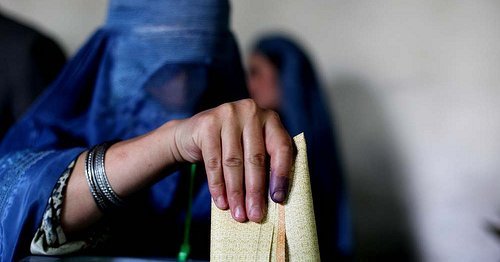Of the forty-four candidates that registered for the presidential campaign at its outset, four have prevailed. Current President Hamid Karzai and his nearest rival Abdullah Abdullah are leading the polls, while Dr. Ramazan Bashardost and Dr. Ashraf Ghani pursue. Whilst this quaternion of candidates does not in any way reflect the major ethnic groups in Afghanistan, it has been argued that they might have considered exploiting their political ties.
US ambassador to Afghanistan Karl Eikenberry and General McChrystal, US Commander in Afghanistan, have formally congregated throughout this summer in order to debate on the present state of the US troops in Afghanistan. Acknowledging that the protection of the civilian population should be on the top of the agenda and declaring that the election was a success over previous occurrences, however, wasn’t enough to stir any immediate action. Nor did it prevent NATO’s strike on Taliban, which devastatingly wiped out the village of Omar Kheil. This calamity consequently led the Talibans to start calling this election as ‘the program of the crusaders’.
The right to freedom of press was assiduously stifled when on the eve of the election, an array of journalists were beaten up with rifle butts for merely refusing to censor election reporting. In the words of Reporters Without Borders, an upfront media watchdog covering all incidences related to the election, this “not only violates media freedom but also the fundamental right of Afghan citizens to know what is going on in their country.” Any kind of negligence would automatically result in reduced credibility of this national matter.
The words expressed by US representatives are not aligning with their actions.
Vote counting is well underway. Nonetheless, the words expressed by US representatives are not aligning with their actions. The inadequate administration of public polls, the inaccurate demographic data available, as well as the handling of votes themselves are the main factors contributing to another characterization of this matter, that of being called a flawed election. Candidate Ashraf Ghani, who is rumored to be favored by the US due to his close ties to the United Nations, has recently emailed US officials with eminent reports of his opponents stuffing election ballot boxes. BBC investigators also maintain that they were offered thousands of voter registration cards through the black market system. In fact, multiple fraud allegations have invalidated some results, leading to a more conservative and delayed counting.
Afghan politicians who were present at Obama’s inauguration last January are eager for change. But is the US providing all the necessary resources to develop and concurrently upkeep an integrated civil-military plan? General Stanley McChrystal has fully recognized the drawbacks of the approach used until now, but has he proposed an alternative plan to the current situation? Admiral Michael Mullen, highest-ranking officer of the US armed forces insists that the US should strive to become a better listener to allow two-way communication to take place.
British Prime minister Gordon Brown’s speech on Afghanistan was somewhat unclear. Brown entirely defends the government’s existing strategy by saying that both the amount of troops in Afghanistan and armor equipment should increase. But through which approach could this be done? Former Labour MP Eric Joyce, who has recently resignated ‘to show that Labour remains sound on matters of Defence’, reminded the BBC that the government as a whole should make it clear that operations in Afghanistan aren’t everlasting, and only serve as an aid to the US troops.
According to Washington Post, in the US, 42% think America is winning the war in Afghanistan, while 36% think it is losing. Which of these two opinion is the most righteous? Should the answer, in any way, give the US a right to interfere in the presidential election?


Follow the comments: |
|
